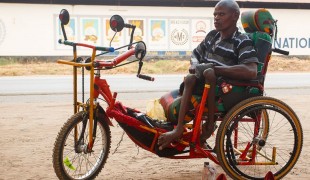- 4953
- 372
- 10
- 8
- 0
- Help Ukraine
About the solution
Geoff and his brother, Mike, say that when designing and building machines they have to meet a simple criterion: they have to be for the common good.
The Ripchair, Geoff claims, is set apart on two fronts. Firstly, he asserts, it’s the most ‘badass’ of the options available and secondly it’s the only chair which requires no transfer. This second point was a main focus in the brothers’ design process as they had found from the people they knew with disabilities, particularly para- and quadriplegics, that transferring between chairs can be time-consuming and inconvenient and so the chair being able to accommodate the user’s wheelchair was a must for them. The Ripchair is also powered by a diesel engine, another must in the design, as it was thought that batteries which required charging would be too unreliable when travelling off-road and could wind up leaving the user stranded.
Other improvements include right or left handed electronic controls, lighting packages, a cup-holder, and add-ons for your recreational pleasure.
Adapted from: http://bit.ly/2gGBhBQ
More info: http://www.trackchairextreme.com/
What about you, do you have any solutions? Please share them with the Patient Innovation community!
https://www.youtube.com/watch?v=nnzNY7X2dNE
This solution shall not include mention to the use of drugs, chemicals or biologicals (including food); invasive devices; offensive, commercial or inherently dangerous content. This solution was not medically validated. Proceed with caution! If you have any doubts, please consult with a health professional.
DISCLAIMER: This story was written by someone who is not the author of the solution, therefore please be advised that, although it was written with the utmost respect for the innovation and the innovator, there can be some incorrect statements. If you find any errors please contact the patient Innovation team via info@patient-innovation.com
-
-
273
-
0
-
2993

Collaborator James Leckey makes equipment to improve the quality of life and social inclusion of children with special needs
MOVING IN A WHEELCHAIR: Moving using a wheelchair.
BODY BALANCE: Maintaining body balance
STANDING UP: Standing up from a seated position
Playing
Neuromuscular Disorders
Assistive Daily Life Device (to help ADL)
Walking Aid (wheelchair/walker/crutches)
Assistive Technology access
5 Senses support devices: (glasses, hearing aids, headphones...)
Restoring mobility
Promoting self-management
Managing Neurological Disorders
Promoting inclusivity and social integration
Maintaining Balance and Mobility
Raise awareness
General and Family Medicine
Neurology
Orthopedics
Pediatrics
Physical Medicine and Rehabilitation
United States
-
-
-
431
-
0
-
5039

Man builds tricycles for disabled people
MOVING IN A WHEELCHAIR: Moving using a wheelchair.
CAREGIVING
Social interaction
Tendon and Ligaments Injuries
Assistive Daily Life Device (to help ADL)
Walking Aid (wheelchair/walker/crutches)
Restoring mobility
Promoting inclusivity and social integration
Maintaining Balance and Mobility
Raise awareness
General and Family Medicine
Neurology
Neurosurgery
Orthopedics
Physical Medicine and Rehabilitation
Rheumatology
Sports Medicine
Ghana
-
-
-
425
-
0
-
5251

Tetraplegic invents mobility device to help him stand up
MOVING IN A WHEELCHAIR: Moving using a wheelchair.
WALKING WITH A WALKING AID: Walking with a walking aid
BODY BALANCE: Maintaining body balance
Spinal Cord and Nerve Root Disorders
Paralysis
Cerebral Palsy
Neuromuscular Disorders
Cervical spinal cord injury/Tetraplegia
Assistive Daily Life Device (to help ADL)
Walking Aid (wheelchair/walker/crutches)
Assistive Technology access
Muscle cramps or spasms
Difficulty coordinating movements
Stiffness or rigidity (difficulty moving)
Paralysis of the legs and lower body
Muscle weakness
Restoring mobility
Managing Neurological Disorders
Enhancing Mental Health
Maintaining Balance and Mobility
Preventing (Vaccination, Protection, Falls, Research/Mapping)
General and Family Medicine
Neurology
Orthopedics
Israel
-
 en
en